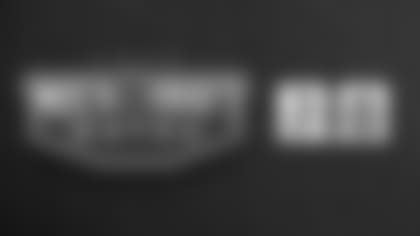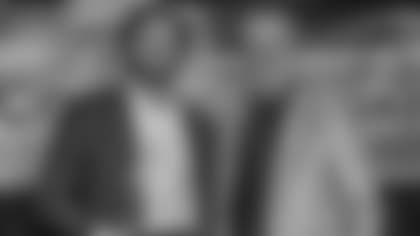The NFL's competition committee made a convincing case for increased safety in the game and the owners responded swiftly at the league meetings in late March passing three proposals that could change the face of special teams play.
Beginning this fall the wedge formation is prohibited on kickoff returns, the bunching of players for onsides kicks has been outlawed and blind side hits or peel back blocks will also be penalized when a helmet-to-helmet hit occurs on return plays.
Bills assistant head coach and special teams coordinator Bobby April has been a busy man since the changes were enacted over a month ago. He's not only begun the process of trying to alter his schemes to fit the new rules, he's also wondering exactly how some of them are going to be officiated.
"Any time you try to legislate hitting out of the game you're going to run into problems because the essence of the game is hitting and contact," said April. "So when you legislate the essence of the game out of the game there is going to be a lot of compromising. There is going to have to be a lot of change involved."
The first rule change which limits the wedge to a maximum of two players is like removing a cornerstone from the foundation of special teams play. The league's Competition Committee maintains that after watching several tapes over the course of several years that the wedge was responsible for too many injuries.
With only two players allowed to form a blocking unit to help the return man, there's speculation that the return man may be more at risk. However, if there are more than two return team members lined up shoulder to shoulder that lead the blocking it will be a 15-yard penalty at the spot of the wedge.
On a play that often ends with a gang tackle, April wonders how officials will be able to determine who is forming the wedge and who is just trying to execute their blocking assignment.
"There are a lot of people that arrive at that ball carrier on a lot of plays and to differentiate whether they're shoulder to shoulder (is difficult)," said April. "Just going to your assignment may make you shoulder to shoulder. The guy you're going against is going to take a path that's going to bring all the bodies relatively close."
Buffalo led the league in average drive start in 2008 thanks to their kick return unit. The Bills have traditionally used a three-man wedge, so April doesn't anticipate the change being as dramatic for them as it might be for other teams.
"There are some teams that run four-man wedges. There are very few that run five, but there have recently been some five-man wedges. So those teams will be most affected," April said. "They'll have more problems making the adjustment and fit to what their players can do."
Having led the league in special teams three of the last five years, one could wonder if Buffalo's specialists were the specific target of the second rule change. The Competition Committee proposed to the owners an onsides kick rule in which players on the kickoff team have to spread across the width of the field more evenly.
At least four players must be lined up on either side of the kicker and at least three players must be lined up outside the hash mark on their half of the field, including one that has to line up outside the numbers.
April is convinced that their "avalanche" onsides kick play is the sole reason for the rule change. Buffalo's kickoff team on occasion would line up with five players on either side of Rian Lindell, with all of them tightly packed between the hashes. Lindell would quickly pooch the ball forward along the ground the required 10 yards and all 10 players plus Lindell would bear down on the loose ball like an avalanche for the Bills.
The first time they made use of it was in 2007 in a home game against the Jets and they successfully recovered the kickoff in a 17-14 victory.
"That's what they're trying to take away, the onsides formation that we did," said April. "That's the thing they're saying you can't do at all. That play that we did against the Jets two years ago and we've done since, that's what they're taking out.
"We did it more than anybody and I had never seen it before anywhere else. Since we did it a lot of people went to it. They've now outlawed that."
Ultimately April isn't too bothered by it having only employed that onsides formation for the last two seasons.
"It's just a reduction in the number of players and you have to put your guys in different spots and make different blocking assignments," he said.
The rule change that has April most perplexed is the 15-yard penalty that will be assessed if a punt return team member makes a blind side block to the head of a defender using his helmet, forearm or shoulder. In essence it's outlawing the peel back block when a cover man focused on the returner never sees a blocker coming from a different direction and gets laid out.
"That one is the biggest of all the changes," said April. "So many times on the punt return the path of the pursuer changes dramatically and how they're going to call it is a mystery to me."
So much so that April has mailed a DVD of different blind side hits to the head of NFL officiating Mike Perreira to obtain a better idea as to how and what will be ruled an illegal hit on a return play and constitute a 15-yard penalty.
"I've got 25 different hits that we're going to be on the phone watching together later this week," said April. "I've got some questions for him because this rule is going to be total judgment on the part of the official. I don't know how they're going to legislate that. He didn't come up with the rule, but he and his men have to enforce it. How they're going to enforce it is the question."
April is against helmet to helmet collisions, but with the bodies moving at such a high rate of speed on special teams plays the impact makes avoiding helmet-to-helmet or shoulder-to-helmet or even forearm-to-helmet contact almost impossible to avoid.
"Just from the compressions of the bodies, the heads hit," said April. "It's going to be similar to the helmet-to-helmet hits on the quarterback where you see some of those calls and you're thinking, 'You've got to be kidding me.' To me you can tell when a guy is trying to use his head as a battering ram and hurt a guy. And you can tell when a guy is making just a really clean hard play. And those are huge plays."
What worries April and likely other special teams coaches around the league is the game will be subject to more interpretation and judgment, which will lead to penalties that could swing the fate of a game.
"It's going to be frustrating for coaches and players because they'll be doing things that just come naturally and they'll feel like they're getting victimized," he said. "And the officials are going to have a tougher time legislating it because it's all judgment and those plays happen in an instant. Officiating is going to become a bigger and bigger part of the game."





